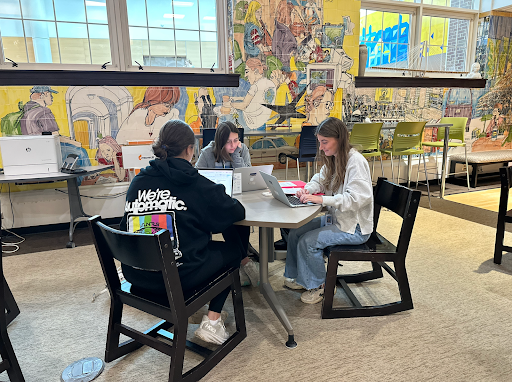Why do we constantly ask each other, “What did you get on the test?” Why does the number of AP’s or honors classes someone takes make us question our own choices? And why does a pair of shoes say something about someone’s worth?
In a school – and society – where comparison has become normalized, students are measuring success less by personal growth and more by how they rank against their peers. Whether it’s grades, classes, college plans, or money, high school is feeling more like a competition. To maintain a healthy mindset, students should focus on their own growth, goals, and accomplishments instead of constantly worrying about keeping up with their classmates.
According to the National Library of Medicine, social comparison and self-acceptance directly influence high schoolers mental health.
“The negative psychological effects of social comparison can be especially potent during adolescence, a developmental period characterised by heightened peer comparison and approval-seeking behaviours,” the National Library of Medicine said. “Research suggests that unfavourable social comparison can lead to feelings of inferiority, envy and dissatisfaction, which may increase the risk of developing symptoms of depression and anxiety.”
The pressure to compare grades is everywhere. Even when I do well on something, I find myself wondering how others performed.Their results somehow determine whether I did “well enough.” If you feel the same way, you are not alone.
Now more than ever, the first few words I hear people ask after getting a grade back is, “What did you get?” Freshman Grant Rice said how uncomfortable the question can make you feel. Whether you receive a good grade or bad grade, there’s no answer that leaves both people walking out of the class feeling confident about themselves.
“The first thing I have always been asked after getting a test back is, ‘what did you get?’” Rice said. “It is a situation where you don’t want to seem like a nerd and be better than everyone else if you got a good grade or seem less than everyone else if you got a bad grade.”
Our grades don’t always reflect our understanding, effort, progress, or the time we’ve spent studying. I think we should focus more on learning and less on “winning.”
Everyone’s perception of a grade’s value is different. What I consider to be a good grade, another person might see as disappointing. I have found that my classmates’ opinions on the value of my own grade change my own perception of what I got. On a recent test I received a B+, and I felt satisfied with my grade. But when my friend told me she got an A, I immediately felt disappointed. I was too busy comparing our grades and criticizing myself to focus on the improvement I had made since my first test.

It’s the same with honors and AP classes. People compare the number they’re taking like a competition. I’ve heard comments like, “You’re only in three?” or “I took five last year,” downplaying the challenge. But to me, it is a big deal––because of the time, energy, and mental well-being.
Some students start to beat themselves up when they feel belittled by their peers. As upperclassmen begin their college journeys, the pressure to take honors and AP classes intensifies. Just beginning research colleges, junior Lauren Hanson said that comparing her transcript to her classmates’ can make her extremely stressed.
“While I was sitting in a college visit, the college representative explained how when reviewing applicants you will be compared to your peers, not necessarily the whole country,” said Hanson. “I have started to feel inferior or less than someone else simply because of our different course rigors.”
I believe students should take the classes that are right for them, not the ones that sound impressive to other people. What’s the point of exhausting yourself to prove a point?
What you wear. What bag you carry. What vacations you go on. These things have become part of the unspoken rivalry at Lake Forest High School. I’ve seen people both complimented and judged based on the brands they wear and what their family can afford.
I scroll on my TikTok feed, watching videos of people shaming others for buying knockoff clothing, otherwise called “dupes.” But I’m not always willing to spend hundreds of dollars on a clothing item. When I find a similar piece for a cheaper price, why do I feel ashamed buying it? That feeling doesn’t come from my opinions––it comes from the fear of being judged.
High school is a time to find who you want to be, but it’s hard when there is this constant pressure to look a certain way. I think everyone should be free to be themselves and comfortable in what they wear without being measured by price tags.
Now, more than ever, I believe that social media is one of the main contributors to comparison. Whether I am scrolling through edited Instagram photos or watching daily vlogs that make everyone’s life look flawless, I am constantly reminded of the unrealistic standards that we are constantly exposed to. It is hard to not fall into the trap of comparing not just my appearance, but also my lifestyle.
From the unrealistic beauty standards to the perfectly portrayed lives, social media features filtered realities that leave many of us feeling insecure.
I’m not saying all competition is bad. But when it becomes the measure of our worth and starts to shape our high school experience, it turns toxic. Constant comparison to our peers doesn’t make us better––it makes us insecure. I’ve felt it, and I’ve seen others struggle with it as well. Collectively, I think we all need to stop asking, “Am I doing better than them?” and start asking, “Am I doing better than I was yesterday?” It’s a question that can strengthen our mindset rather than tear us down.
As students, we spend roughly 33 hours at school every week; it is a huge part of our lives. I constantly remind myself that my worth isn’t defined solely by what I do at school. Students, including myself, have the opportunity to take part in over 50 unique clubs, a variety of sports throughout the school year, jobs outside of school, and volunteer programs.
This year, I am taking four AP classes, which may seem light to some at LFHS and heavy to others; but no one knows you better than yourself. In addition to the rigorous courses I am enrolled in, I play two sports, participate in over four clubs, and hold two jobs. These commitments are very time-consuming and can be stressful, which is why I also prioritize time with my friends and family. I considered all these factors when choosing my courses for Junior year, and I understood my limits. What I didn’t consider? I didn’t consider what classes my peers signed up for––because high school shouldn’t be a competition.
Not everyone is meant for five AP’s. Not everyone learns at the same pace. And not everyone can spend money on designer clothes. And that is all right. It is important for students to understand that everyone has different priorities and goals throughout high school.
I would encourage all students to stop competing for validation and start showing up for themselves. You shouldn’t feel obligated to win an invisible competition to be proud. Your worth isn’t determined by how you compare to your classmates, but by who you are and what you do.
Judy Garland, an actress and singer, spoke of the importance of being proud of your own qualities and accomplishments rather than trying to copy others. She once famously said, “Always be a first-rate version of yourself, instead of a second-rate version of somebody else.”
I think that this is the kind of mindset that every student deserves to grow up with.














